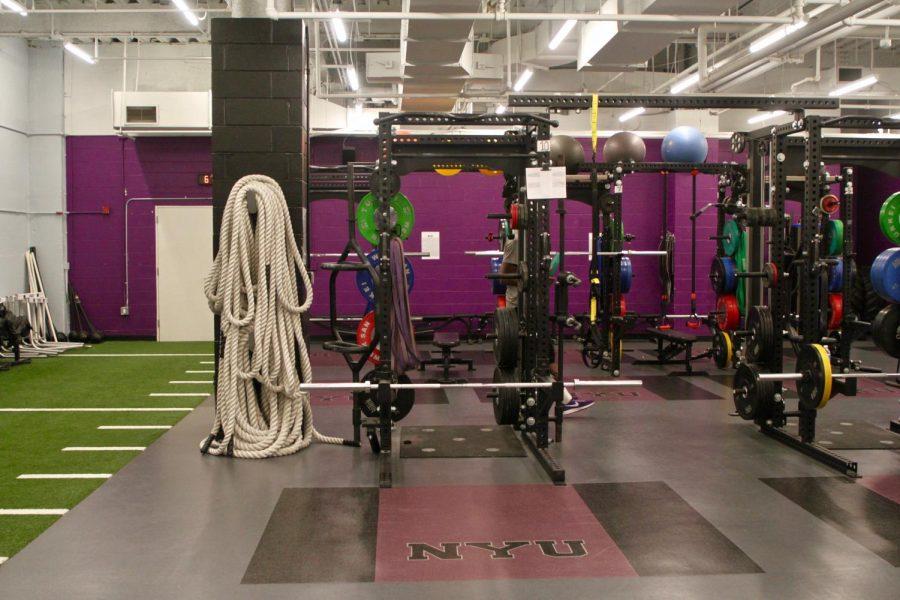On the lowest floor of Palladium Athletic Facility, a small, unassuming room operates as a hub for NYU student-athletes. Sandwiched between a conference room and the Varsity Performance Center, the sports medicine staff works in the training room to make sure athletes have a plethora of resources to optimize their performance on and off the field.
The sports medicine staff oversees much of the overall health and safety of NYU’s over 850 student-athletes. Coordinator of Athletic Training Services Nikki Webb describes her role as a professional who helps ensure the wellness of student athletes.
“We can help facilitate medical care for them, start them on some rehab and get them back to their sport safely and quickly,” Webb said.
The sports medicine staff also includes Assistant Athletic Trainers Matthew Devens, Arturo “Roy” Flores, Chelsea Nugent and Angela Severn, as well as Dr. Dennis Cardone, the supervising team physician.
As a middle ground between healthcare and the university, student-athletes see the resource as primarily a place to go for any physical issues they are having.
“If you’re injured, they can give you a program and physical therapy to help you feel better faster and get back on the team and training as soon as possible,” women’s fencer and CAS sophomore Sarah Prilutsky said.
The Athletic Training Room is open to all athletes Monday through Thursday from 10 a.m. to 7 p.m. and on Fridays from 10 a.m. to 6 p.m.
Women’s soccer midfielder and Stern sophomore Hailey Hirano explained that the treatment is not just for when something goes wrong.
“You can go in daily to stay on top of how you feel and get ahead of your injuries,” Hirano said. “It basically works like office hours or whenever the trainer is with your team, and you can get taped or rolled out or iced.”
Each team is assigned a trainer who oversees and specializes in injuries in that sport. That way, the trainer can develop a more personal relationship with the specific team and its athletes.
Hirano said that Severn, the trainer for the women’s soccer team, supports the players by addressing their medical and emotional needs.
“On the sidelines, [Severn] really roots for us,” Hirano said. “She really cares about us personally, but also how we do as a team, and she’s the first one to clap and cheer for us when we score.”
While each team has a designated trainer, athletes feel comfortable approaching any member of the sports medicine staff when they need assistance.
Women’s soccer player and Tandon senior Callie Delaney works with Devens and Flores in addition to Severn.
“They’re both really awesome and helpful,” Delaney said. “With any issues we have, they communicate back to [Severn] what is going on.”
These open lines of communication are also important between the medical staff and each team’s coaching staff.
“They communicate to the coaches with what is going on so that practices and lifts can be modified so that you’re not overstraining yourself,” said CAS sophomore Rachel Reistroffer, a member of the women’s swimming and diving.
In addition to working with student-athletes and coaching staff, the sports medicine staff also serves as a bridge to the strength and conditioning department.
“Injury prevention is built into a lot of [student-athletes’] programs,” Webb said. “So, it’s built into their season as opposed to working on fixing injuries at the peak of their season.”
Though many athletes are subject to similar overuse injuries in their sport, Assistant Athletic Trainer Flores said there are a lot more factors at play for NYU student-athletes, specifically.
“Not only are you responsible to go to class and go to practice, but you’re also exposed to the kind of lifestyle that NYC leads — especially the walking around, and the fashion part of it,” Flores said. “[Students] complain of their feet, they complain of their hips, then you look at their footwear and you’re like ‘Well, is this what you’re wearing?’”
“Sometimes fashion can be the enemy of athletics,” he added.
Aside from physical ailments, the sports medicine department also acts as a connection between NYU’s mental health resources and students. Athletic trainers can link student-athletes to clinical social worker Lauren Shah and mental performance coach Ben Olivia, who help students work through any mental stressors they may be facing.
The department hopes to provide student-athletes the resources they need to succeed throughout their college careers — but also afterward.
“We want to make sure by the end of their four years here, anything that is bothering them — whether it is an illness or injury, or even mental health stuff — that they can go and do whatever it is that they want to do,” Flores said.
A version of this article appears in the Tuesday, Oct. 15, 2019, print edition. Email Rebecca Choi at [email protected].






















































































































































